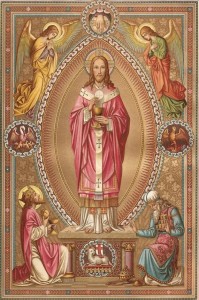The Priest as Sacrifice and Victim: the Sacrificial Nature of the Sacred Priesthood
 by Fr. Eric P. Flood, FSSP
by Fr. Eric P. Flood, FSSP
From the August 2011 Newsletter
As priests are to “offer up gifts and sacrifices for sins” (Heb. 5:1), Christ, the Eternal High Priest, being perfect, could offer only the most perfect Sacrifice in atonement for sin. Since there is no greater sacrifice than to lay down one’s life, He sacrificed Himself during His passion and death upon the Cross for the salvation of mankind.
This one Sacrifice is continually presented to His Father in the heights of Heaven and is made present on earth every time a Catholic priest offers Holy Mass. The greatest glory of the priesthood is approaching the altar, in imitation of Christ, and offering the same Sacrifice, although in an unbloody manner.
But the example of Christ also shows that the priest is more than one who offers a Sacrifice upon the altar: he is also one who is to be sacrificed for the salvation of souls. Our Lord’s example of rising from the dead and ascending into Heaven only after a life of sufferings and toil indicates to every subsequent priest what to expect in this life.
“If any man will come after me, let him deny himself and take up his cross and follow Me” (Mt. 16:24). As the life of Christ was a constant series of privations, humiliations, fatigue, and labors from Bethlehem to Calgary, so too will be the life of the priest. If the student is to become as the Master, the sufferings in this life need to be received in a spirit of gladness and joy for the glory of God and the salvation of souls throughout the world.
As Christ was sacrificed as the Paschal Lamb, unblemished and unspotted, He was led to the shearers without uttering a sound. Now, men raised to the dignity of the priesthood have the duty of living a holy life, and, if necessary, following the slain Lamb to martyrdom.
It is necessary, then, for those discerning a vocation to the priesthood to understand this notion of being willing to offer one’s life to God and to embrace suffering and labor in a spirit of charity. The formation of seminarians needs to inculcate this true spirit of sacrifice so that each candidate comprehends his life as no longer his own.
The priesthood is not like a secular job in which one decides his profession; rather, the priest is chosen by God (Heb. 5:4). The man does decide to embrace God’s calling or not, but such a pursuit cannot be for selfish reasons such as money, recognition, or an easy life.
The history of the Church shows what happens when priests do not live their priesthood in imitation of the suffering Christ, for it spills over into the lives of the faithful. The adage goes as follows: a holy priest yields a fervent parish; a fervent priest yields a good parish; a good priest yields a lukewarm parish; and a lukewarm priest yields a cold parish.
But few are those who are willing to persist in a life of suffering joyfully for the Church. Christ Himself declared this when He said that “many are called, but few are chosen” (Mt. 22:14). Whereas God always provides for the Church in calling a sufficient number of men to be priests, oftentimes there is not a shortage of priests; rather, only an insufficient number of good and holy priests willing to suffer in imitation of Christ.
And the sufferings can be immense and varied, ranging from physical deterioration and ailments to the venom of tongues found in false accusations and ridicule. Hence, one of the marks of a vocation to the priesthood is the willingness to learn how to suffer out of love for God.
As a result, seminaries are often nicknamed “The School of the Cross.” Priests who survived imprisonment at Dachau in World War II afterwards professed that the priesthood was better understood by what they had to suffer.
Thus, the burdens placed upon a priest’s shoulders become a fitting preparation for the next time he celebrates Holy Mass. And his life in conformity to Christ Crucified transforms his daily burdens into light and sweet labor.
August 5, 2011








